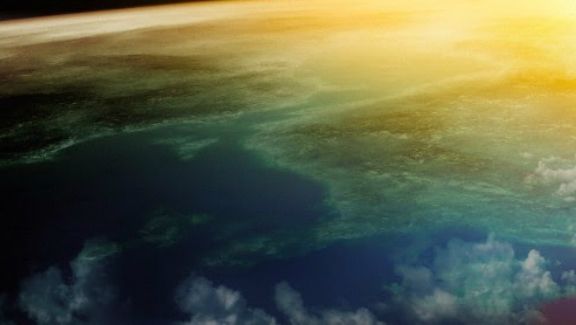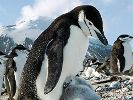Eye For Film >> Movies >> Earth: One Amazing Day (2017) Film Review
Earth: One Amazing Day
Reviewed by: Jennie Kermode

It may no longer be seen as the voice of a nation, but if there's one area where the BBC still excels, it's in its natural history programmes. This is an area where it's not possible to do it on the cheap, and where the difference between hasty compilation of lucky shots and professional footage compiled over months really shows. If you like the idea of seeing some of the broadcaster's best work on the big screen then Earth: One Amazing Day is for you.
The film follows a day in the life of planet Earth, beginning as the Sun rises and following it through until evening - then, briefly, night. We see the impact of dawn as it warms sea iguanas to the point where they move, and as birds sing and manta rays leap up to celebrate it. By noon, parts of the world are baking; lions eye weakened prey but are themselves too tired to hunt. In the evening, as crepuscular animals emerge, others hurry to safety or make a frantic last ditch attempt to gather enough food for the coming night.

It's not only animals we encounter here. We see fly traps warm up and stretch as the day begins, hungry for fresh meaty prey, whilst other plants turn the light itself into food. We also see the impact of the daily cycle on non-living things. Sheets of ice crack and the pieces collide, changing the natural environment.
Viewers should be aware that not all the footage in the film is new. A young iguana running from snakes and a sloth searching in vain for the female whose call roused him from his reverie are just two stars whose scenes may be familiar to you, but the shift to the big screen alters their impact, and few fictional films offer anything as thrilling as the sight of layered snakes darting from ambush. Whilst the reframing of these stories goes some way to breaking the narrative illusion, the film's character focused moments still have their charm. Penguins can always be relied upon to deliver.
Unlike the BBC's television product, the film has a rather heavy-handed narrative and sometimes stretches the truth to make a point. An intro sequence tells us that Earth is unique in the universe - fair enough - but then goes on to focus on the fact it's a rocky world in the Goldilocks Zone when it's estimated that our galaxy alone contains around 30 billion planets like that. As far as we know, it's the only one to contain life, we're told, as if that means something when we've barely explored any of the others. To any educated viewer this undermines, rather than emphasises, the important point that Earth is pretty cool. The film is better when it steps back from telling us how amazing everything is and lets the images speak for themselves.
Watching on the big screen creates a sense of immersion perfectly suited to this subject, whether we're among crashing waves, out on the wide savannah or deep in the heart of the forest. It's this that is the film's real strength. Its very precise format gives it naturally tight pacing and it doesn't outstay its welcome.
Reviewed on: 04 Oct 2017


















